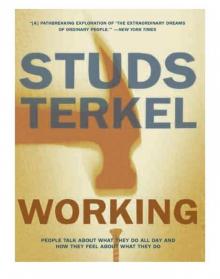- Home
- Studs Terkel
Working Page 10
Working Read online
Page 10
Until recently I’d cry in the morning. I didn’t want to get up. I’d dread Fridays because Monday was always looming over me. Another five days ahead of me. There never seemed to be any end to it. Why am I doing this? Yet I dread looking for other jobs. I don’t like filling out forms and taking typing tests. I remember on applications I’d put down, “I’d like to deal with the public.” (Laughs.) Well, I don’t want to deal with the public any more.
I take the bus to work. That was my big decision. I had to go to work and do what everyone else told me to do, but I could decide whether to take the bus or the el. To me, that was a big choice. Those are the only kinds of decisions you make and they become very important to you.
Very few people talk on the bus going home. Sort of sit there and look dejected. Stare out the window, pull out their newspaper, or push other people. You feel tense until the bus empties out or you get home. Because things happen to you all day long, things you couldn’t get rid of. So they build up and everybody is feeding them into each other on the bus. There didn’t seem to be any kind of relief about going home. It was: Boy! Did I have a lot of garbage to put up with!
One minute to five is the moment of triumph. You physically turn off the machine that has dictated to you all day long. You put it in a drawer and that’s it. You’re your own man for a few hours. Then it calls to you every morning that you have to come back.
I don’t know what I’d like to do. That’s what hurts the most. That’s why I can’t quit the job. I really don’t know what talents I may have. And I don’t know where to go to find out. I’ve been fostered so long by school and didn’t have time to think about it.
My father’s in watch repair. That’s always interested me, working with my hands, and independent. I don’t think I’d mind going back and learning something, taking a piece of furniture and refinishing it. The type of thing where you know what you’re doing and you can create and you can fix something to make it function. At the switchboard you don’t do much of anything.
I think the whole idea of receptionists is going to change. We’re going to have to find machines which can do that sort of thing. You’re wasting an awful lot of human power.
I’ll be home and the telephone will ring and I get nervous. It reminds me of the telephone at work. It becomes like Pavlov’s bell. (Laughs.) It made the dogs salivate. It makes me nervous. The machine invades me all day. I’d go home and it’s still there. It’s a very bad way to talk to people, to communicate. It may have been a boon to business but it did a lot to wreck conversation. (Laughs.)
FRANCES SWENSON
A bungalow in a lower-middle-class neighborhood in the city. A widow, she lives with her grown son. “How would I describe myself? A happy-go-lucky middle-aged woman.” (Laughs.)
The walls are decorated with paper tole. It is her handiwork. “It actually looks like real flowers. I enjoy keeping my hands busy. It keeps me out of trouble. I also sew, but I wouldn’t want to make my living doing that. The eyes kinda get faded after you get older. You have to have extra strong glasses to see to sew.”
She is a switchboard operator at a large motel frequented by conventioneers. She has had this job for three years, though she has been a tele-phore operator for at least fifteen.
“There are always five girls at the board. They can only take lunch one at a time. I’m fifty. The little one next to me is twenty. The one next to her is twenty. The other one’s about forty. And the other one’s about thirty-five. Oh, I love ’em and they love me. They think I’m a great old lady.” (Laughs.)
You have to have a nice smiling voice. You can’t be angry or come in like you’ve been out the night before. (Laughs.) You always have to be pleasant—no matter how bad you feel.
I had one gentleman the other day and he wanted an outside call. I asked his name and room number, which we have to charge to his room. And he says, “What’s it to you?” I said, “I’m sorry, sir, this is our policy.” And he gets a little hostile. But you just take it with a grain of salt and you just keep on working. Inside you and in your head you get mad. But you still have to be nice when the next call comes in. There’s no way to let it out. I’m pretty easy to get along with. I’m not the type to get angry on the phone.
You try to imagine what they look like, which is very hard. Even age is hard to tell on the phone. My phone voice is a lot different than my home voice. I can call the switchboard right now and they wouldn’t know it was me.
First thing I do is get my headset on, and I sit down at the board to relieve the girl that’s been working all night. This is a board that’s twenty-four hours. It’s the type of chair that a stenographer would sit on. Believe me, after eight hours, it’s not a comfortable chair. (Laughs.) We are constantly kept busy. There isn’t an idle moment. There’s not much time to converse. I have worked in different offices and you can even take the chance to pick up a crochet hook, to keep your fingers busy. Not here.
I worked 125 hours last two weeks. We asked the boss why we didn’t get time and a half overtime. He says, “Well, the girls at the front desk are getting it, I don’t see why you don’t. You’ll get it starting the first of the month.” We were informed today we were not going to get it. The one that told us okayed it, but there are two higher in the hotel than he.
At one time, they tried to bring the union in, but two girls voted it down and then they decided to quit. But it has to be. Because I lost my weekend. I was invited to a cookout and I didn’t go. They needed me, so I figured okay, I’ll go, they need me. But I lost out on a little fun.
It’s the tension you’re under while you’re sitting there working. At one time Illinois Bell had a rest home. Years ago, when the switchboard operators became tense, overwrought, they sent them there. They had nervous breakdowns. They don’t have it now because I think things have gotten easier.
I’m tired at the end of the day. Say you pick up a thousand calls a day, and these cords are on heavy weights, and they get pretty heavy at the end of eight hours. You go to pick ’em up and they’ll slide right out of your hand, and you drop it. I worked with an operator who said she had more strength in her hand than a man because of using her hand all day.
This board where I’m at now, you have to reach. The jacks are up pretty high. It’s not easy on the arms. Sometimes the cords are so close together as your fingers and you’ve got to reach in-between if they want that number in-between, so you break your fingernails.
When you get up like in my age and go to work, it’s a grind. We can’t take even one break because you’re constantly needed.
If you got to go, you’ve got to come right back. ’Cause you don’t get a fifteen-minute break. This last week, when we were so busy, I said it would be nice if we had a place to stretch out. Sometimes you get so wound up you don’t want to eat. I didn’t want to eat for a couple of days, not because I wasn’t hungry, but I didn’t want to eat downstairs and there was nowhere else to go to get food. I went and sat in a different department just to get away from the switchboard. Because it’s the yackety-yak and constant conversation, and it’s really noisy.
You’re never without your headset. Your cords are retractable and you’re talking as you get a drink of water. It’s a pitcher we have about fifteen feet away. We’re still plugged in and we’re saying, “Can I help you, sir?”
When you see one girl kinda slow down and relax, it puts the burden on the other girls. The main thing is to get the cord out of your hand and get rid of the call. If a customer wants to know how much the meals are, you don’t sit and tell them, you give the call to the restaurant. Some of these people I work with will sit and they will explain everything. You’ve got to get rid of the call. The telephone company trains you to pick up more than one call at a time.
A lot of men don’t realize what a switchboard is and how complicated they are. We had one of the young men—an assistant manager trainee—he worked just the lunch hour, and he had it. You got to memorize all the departments. You c
an’t keep looking at your sheets, you gotta remember these things.
I think switchboard operators are the most underpaid, ‘cause we are the hub of everything. When you call somebody, you want immediate service. Of course, I chose the job. If you choose the job, it’s your responsibility. Just because I feel I’m not paid enough doesn’t mean I’m not gonna give ’em good work.
The kids today don’t work like the older women. They take a job as it comes. If they want to work, they work. If they don’t, they fool around. We have a couple that sit on the phone half of the day, take time out. That puts the burden on the rest of the girls. The older women are more loyal, they’re more conscientious, they don’t take time off.
I had to have plumbing done in the back yard here. I asked a girl to switch shifts with me so I wouldn’t keep them hanging that they couldn’t get a girl to come in. I said if you can work my trick, I’ll work yours. Where the other girls, they’d say, “I’m staying home tomorrow.”
Anybody that has done switchboard likes switchboard. It’s not lonesome. You’re talking to people. You ask another switchboard operator, they like it.
Want to hear a good one? (Laughs.) It was one o’clock in the morning. A phone call came in. I worked the night shift. And I said, “Holiday Inn.” I said it because we’re not Holiday Inn, I was just fooling around. The little girl I worked with turned me in. So the boss called me in. She said, “Why did you do it?” I said, “Just for a lark. It was quiet, nothing to do.” She said, “Fran, you’re a good operator and we all love you, but I don’t know why you did it.” I said, “I wanted to have a little fun.”
The little girl, after she did it, she said she was sorry. About a week later, I said to her, “Young lady, I was gonna quit, but I wouldn’t do it for the likes of you.” And she says, “Fran, I admire you because you didn’t say anything to me in front of the boss.” And I said, “Well, you’re pretty low because you have done things I would never have told on.”
The operators’ code is: You don’t hear what the one next to you is saying. This is the way I was taught. Whether she’s flirtin’ with somebody is none of my business. What I done I did for fun. I didn’t think it was very bad. (Laughs.)
I never listen in on a phone conversation, but I’ll tell you what. I worked for Illinois Bell and I don’t care who the operator is, the greatest thing is listening on phone calls. (Laughs.) When you’re not busy. At the motel, no. At Bell, I did. If you work nights and it’s real quiet, I don’t think there’s an operator who hasn’t listened in on calls. The night goes faster.
At the phone company, during the war, there were times when we had to listen in on a call that would be—I’ll say a Spanish-speaking person. They were being monitored. We’d have to say, “This is the Spanish-speaking call.” You can monitor any switchboard.
I always had my fingers in the switchboard. We get real friendly. We’re supposed to wear our names. Mine’s just Frances. It’s not even Frances, I’m Fran. The assistant manager, we refer to him as mister. I’ve always respected a name. These young kids today don’t. They call people by their first names. The last place I worked, we called him mister. He was a buyer and I figured he should have respect. I’m only a switchboard operator. I’m Fran. It wouldn’t be miss.
But I feel they need us badly. They need us to be polite and they need us to be nice. You cannot have a business and have a bad switchboard operator. We are the hub of that hotel.
And we don’t get respect. We don’t get it from the bosses or the guests. Although they are nice to us. But if they knew how hard we worked. Today communications is the big thing. So much business is over the phone. I really think we demand a little more respect.
We sit there and we joke, “Wouldn’t it be great if we could just take this handful of plugs and just yank ‘em?” (Laughs.) We think of it, we think of it. Like I said, you get so tense . . . If we could just pull ’em. (Laughs.) Disconnect them and see what happens. You accidentally disconnect somebody, which happens quite often. You don’t do it on purpose, although there are times when you feel you’d like to do it.
HEATHER LAMB
For almost two years she has been working as a long distance telephone operator at Illinois Bell. A naval base is nearby. She works three nights a week, split shift, during the high-school season and a full forty hours in the summertime. She is turning eighteen.
It’s a strange atmosphere. You’re in a room about the size of a gymnasium, talking to people thousands of miles away. You come in contact with at least thirty-five an hour. You can’t exchange any ideas with them. They don’t know you, they never will. You feel like you might be missing people. You feel like they put a coin in the machine and they’ve got you. You’re there to perform your service and go. You’re kind of detached.
A lot of the girls are painfully shy in real life. You get some girls who are outgoing in their work, but when they have to talk to someone and look them in the face, they can’t think of what to say. They feel self-conscious when they know someone can see them. At the switchboard, it’s a feeling of anonymousness.
There are about seven or eight phrases that you use and that’s it: “Good morning, may I help you?” “Operator, may I help you?” “Good afternoon.” “Good evening,” “What number did you want?” “Would you repeat that again?” “I have a collect call for you from so-and-so, will you accept the charge?” “It’ll be a dollar twenty cents.” That’s all you can say.
A big thing is not to talk with a customer. If he’s upset, you can’t say more than “I’m sorry you’ve been having trouble.” If you get caught talking with a customer, that’s one mark against you. You can’t help but want to talk to them if they’re in trouble or if they’re just feeling bad or something. For me it’s a great temptation to say, “Gee, what’s the matter?” You don’t feel like you’re really that much helping people.
Say you’ve got a guy on the line calling from Vietnam, his line is busy and you can’t interrupt. God knows when he’ll be able to get on his line again. You know he’s lonesome and he wants to talk to somebody, and there you are and you can’t talk to him. There’s one person who feels badly and you can’t do anything. When I first started, I asked the operator and she says, “No, he can always call another time.”
One man said, “I’m lonesome, will you talk to me?” I said, “Gee I’m sorry, I just can’t.” But you can’t. (Laughs.) I’m a communications person but I can’t communicate.
I’ve worked here almost two years and how many girls’ first names do I know? Just their last name is on their headset. You might see them every day and you won’t know their names. At Ma Bell they speak of teamwork, but you don’t even know the names of the people who are on your team.
It’s kind of awkward if you meet someone from the company and say, “Hi there, Jones,” or whatever. (Laughs.) It’s very embarrassing. You sit in the cafeteria and you talk to people and you don’t even know their names. (Laughs.) I’ve gone to a lot of people I’ve been talking to for a week and I’ve said, “Tell me your name.” (Laughs.)
You have a number—mine’s 407. They put your number on your tickets, so if you made a mistake they’ll know who did it. You’re just an instrument. You’re there to dial a number. It would be just as good for them to punch out the number.
The girls sit very close. She would be not even five or six inches away from me. The big thing is elbows, especially if she’s left-handed. That’s why we have so many colds in the winter, you’re so close. If one person has a cold, the whole office has a cold. It’s very catchy.
You try to keep your fingernails short because they break. If you go to plug in, your fingernail goes. You try to wear your hair simple. It’s not good to have your hair on top of your head. The women don’t really come to work if they’ve just had their hair done. The headset flattens it.
Your arms don’t really get tired, your mouth gets tired. It’s strange, but you get tired of talking, ’cause you talk constantly for six
hours without a break.
Half the phones have a new system where the quarter is three beeps, a dime is two beeps, and a nickel is one beep. If the guy’s in a hurry and he keeps throwing in money, all the beeps get all mixed up together (laughs), and you don’t know how much money is in the phone. So it’s kinda hard.
When you have a call, you fill it out on this IBM card. Those go with a special machine. You use a special pencil so it’ll go through this computer and pick up the numbers. It’s real soft lead, it just goes all over the desk and you’re all dirty by the time you get off. (Laughs.) And sometimes your back hurts if your chair isn’t up at the right height and you have to bend over and write. And keeping track. You don’t get just one call at a time.
There is also the clock. You’ve got a clock next to you that times every second. When the light goes off, you see the party has answered, you have to write down the hour, the minute, and the second. Okay, you put that in a special slot right next to the cord light. You’re ready for another one. Still you’ve got to watch the first one. When the light goes on, they disconnect and you’ve got to take that card out again and time down the hour, the minute, and the second—plus keeping on taking other calls. It’s hectic.
If you work the day shift, conversations are short, so they come down in time amount to trying to take down a man’s credit card number and collecting another man’s money. One man waiting for his overtime, another man waiting for you to put his call through. Sometimes your tickets get all messed up—and that makes people even madder. And it doesn’t help when people are crabby and they don’t talk loud enough.
Businessmen get very upset if they have to repeat their credit card number. Sometimes they’re talking to you and they’re talking to their partner and you’re trying to listen for the number. They’ll say something to their partner and you think it’s for you and they get irritated. You get very sensitive to people’s voices. Sometimes you get mad. Why should this man be yelling at me? I do feel put-down a lot.

 Will the Circle Be Unbroken?
Will the Circle Be Unbroken? Hard Times
Hard Times Working
Working Touch and Go
Touch and Go P.S.
P.S. The Studs Terkel Reader_My American Century
The Studs Terkel Reader_My American Century